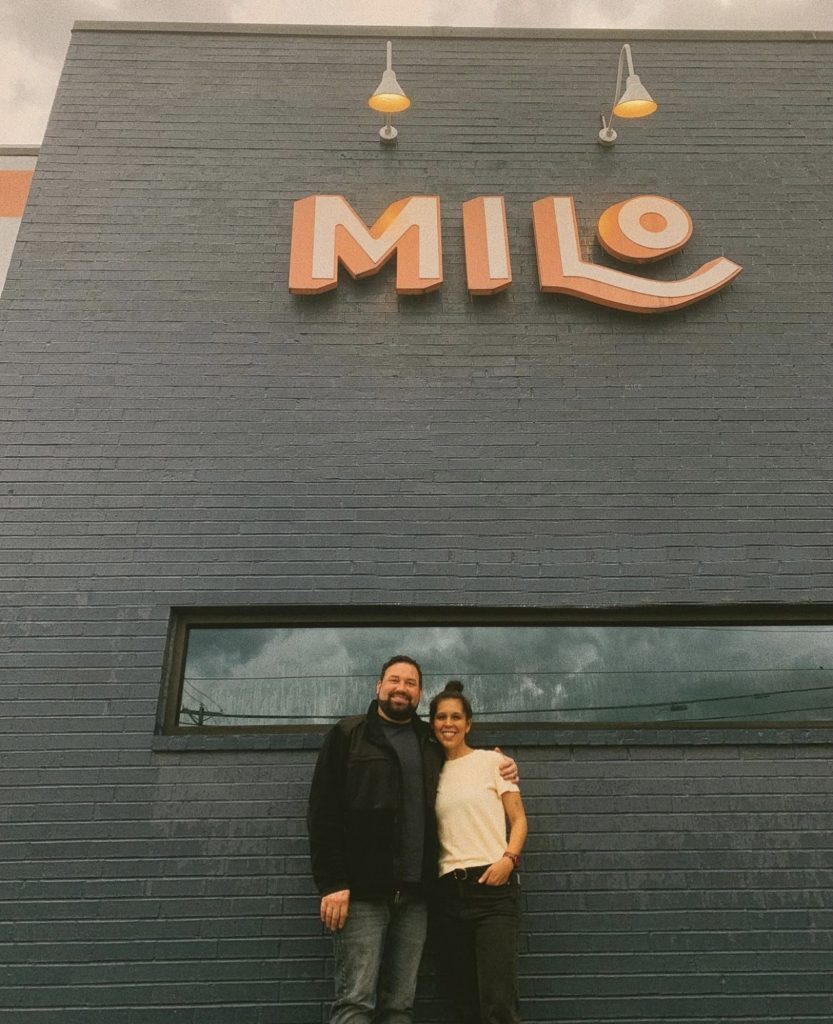By Terry Roller
Following a successful first Golden Oldies Edition at the Waco Hippodrome in June, the Stars Over Texas Jamboree will present its first Legends of Country Edition at the historic downtown theatre, 724 Austin Ave. on Tuesday, July 8. Pre-show begins at 6:45 p.m., and showtime is 7 p.m.

Special guests include Danny Ragland as Willie Nelson, Bridgett Huffhines as Patsy Cline, and Jamboree partner Johnnie Bradshaw as Jim Reeves, along with the Jamboree partners, band, and cast.
Tickets are assigned seating. Seats are $20, $16, $14, and $12 (balcony) plus sales tax and a small processing fee. Tickets are available on the Hippodrome website and at the door on the night of the show, though by that time the remaining seats may most likely be balcony seats. Limited $16 (plus tax and processing) advance tickets will also be available at Lone Star Music, 929 Lake Air Dr. Ample parking is available within a block of the Hippodrome including on and off-street parking.
The Hippodrome location provides visitors the opportunity purchase a selection of adult beverages, water, and soft drinks while watching the show.
Shows will follow all current CDC and government mandates and Hippodrome policies regarding masking and social distancing at the time of the show. Check the Hippodrome website and Facebook page and the Stars Over Texas Jamboree Facebook page for changes or updates. Should there be another shutdown, this show will be rescheduled at the earliest possible date.
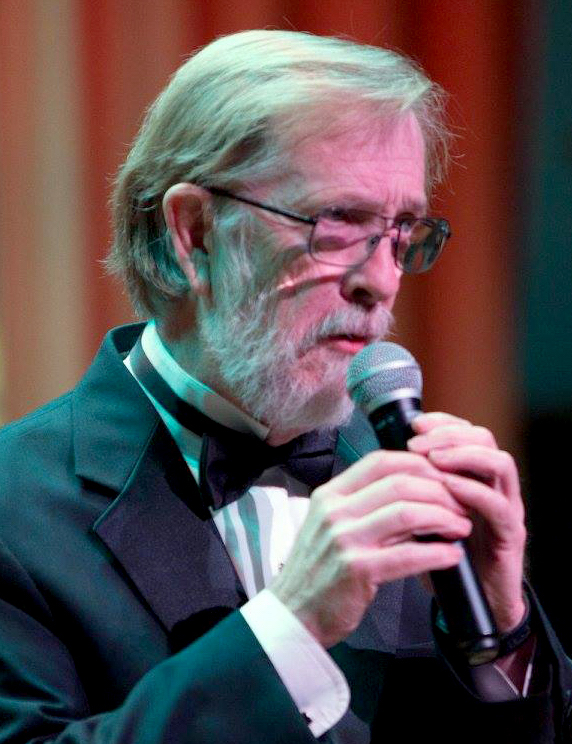
Terry Roller is a retired graphic design professor from Baylor, having taught there for 33 years in addition to 6 years at Eastern Illinois University and 4 years as a teaching assistant at the University of Tennessee where he holds a BFA and MFA in design. He is also a partner in the Stars Over Texas Jamboree. He acts as vocalist, designer, roadie, and occasional emcee and comic.
The Act Locally Waco blog publishes posts with a connection to these aspirations for Waco. If you are interested in writing for the Act Locally Waco Blog, please email Ferrell Foster at [email protected].
By Maddie McNamee
On June 14, the Waco ISD Summer Food Service Program returned to Waco with promises to provide meals for all children ages 1-18, regardless of their enrollment in school. The program, which has been in effect in Waco for a few years now, was a saving grace for many families last year who were financially impacted by the COVID-19 pandemic. Food insecurity became a global issue as income began to dwindle and everyday expenses remained. The Summer Food Service Program took some of the financial burden away from struggling caretakers and ensured that no child would have to worry where their next meal came from.
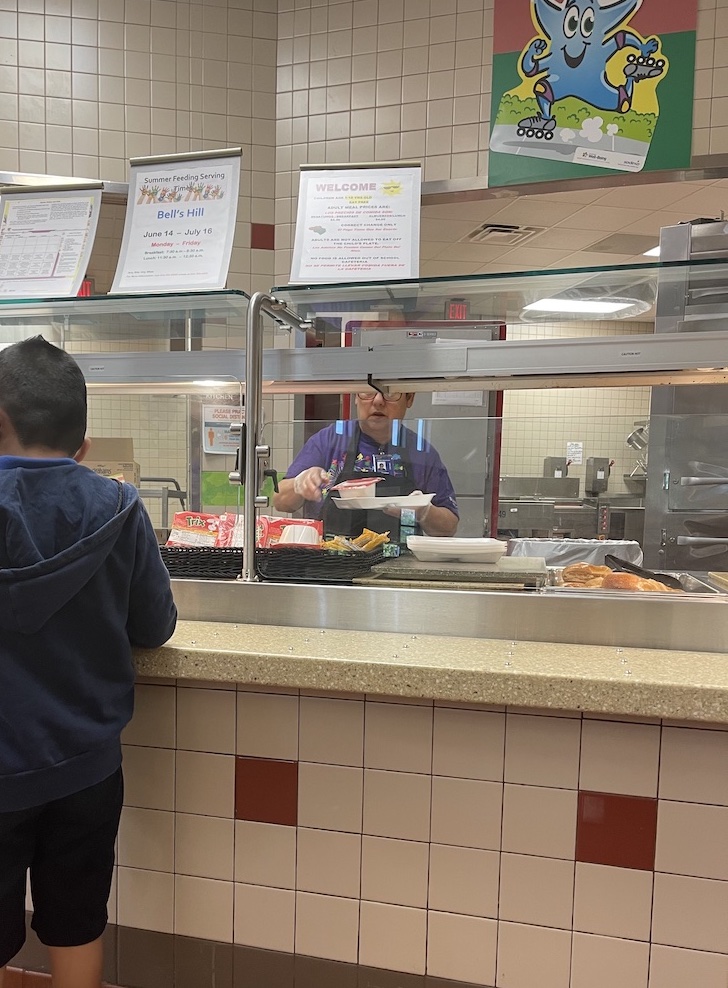
With the distribution of the COVID-19 vaccine and the end of the pandemic in sight, Waco seems to be showing signs of healing. Businesses are reopening, restrictions are being lifted, and people are reuniting with their loved ones. Going for a quick drive around Waco only to get stuck in traffic feels like things are slowly going back to normal.
Despite these returns to normalcy, food insecurity is still a very real and prevalent problem in Waco. An issue before the coronavirus, the challenge of putting food on the table, only became greater when the world went into lockdown. It is easy to wish for things to go back to normal, but it is also important to remember that while the option to go to a restaurant is now available, not everyone has the financial ability to do so after such a challenging year.
The Waco Independent School District identified these difficulties that residents of Waco were facing and not only brought the Summer Food Service Program back, but expanded it substantially, making it easier for children to have access to a free breakfast and lunch seven days a week. With 38 locations serving the free meals at designated times, every child in Waco should have the opportunity to enjoy the return of a semi-normal summer without the pangs of hunger.
The service will run Monday through Friday, with the exception of July 5, when it will close for the Independence Day holiday. Packaged meals will be available to pick up for the weekend on Fridays. With the return of school in the fall, the program will end August 18. For more information on service times, locations, and updates, you can head to https://www.wacoisd.org/summermeals. Many of these schools are seeking volunteers and if you would like to help operate a Summer Food Service Program site, check out https://www.fns.usda.gov/sfsp/summer-food-service-program to see if you are eligible.
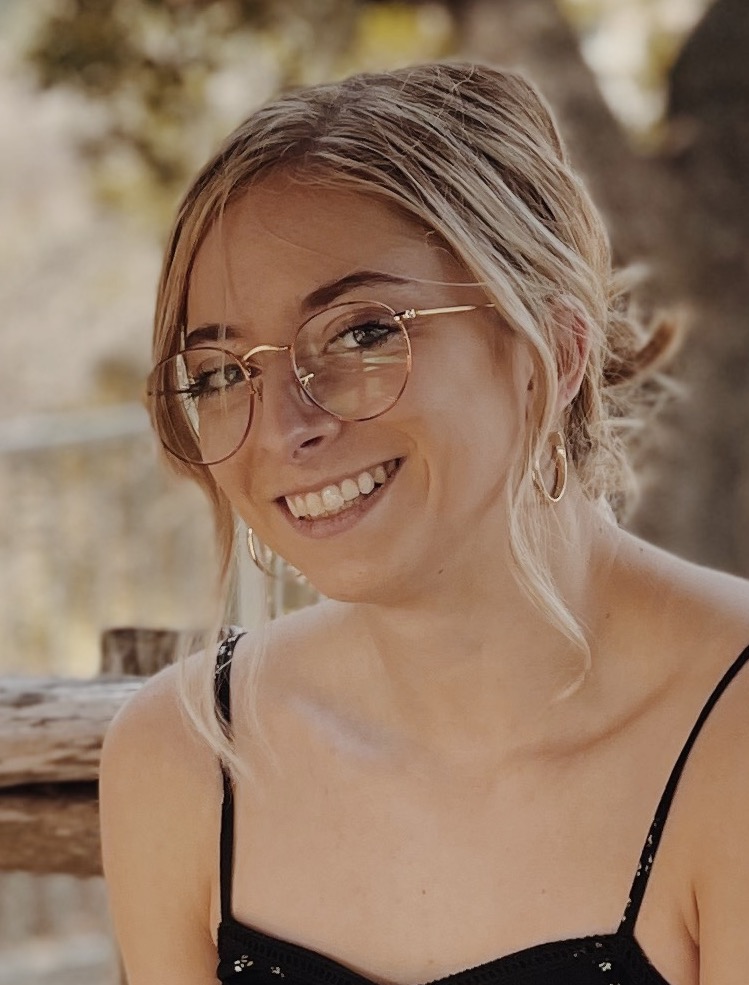
Maddie McNamee is a creative writing intern with Act Locally Waco. She is a student-athlete at Baylor University and is pursuing a major in Professional Writing and Rhetoric.
The Act Locally Waco blog publishes posts with a connection to these aspirations for Waco. If you are interested in writing for the Act Locally Waco Blog, please email Ferrell Foster at [email protected].
By Dr. Peaches Henry
I grew up in Palestine, about two hours due east of Waco, where Juneteenth was a huge holiday in the Black community and in my family as well.
Abraham Lincoln’s Emancipation Proclamation became effective Jan. 1, 1863, declaring “that all enslaved persons in the Confederate States of America in rebellion and not in Union hands were freed.” Yet, it was not until two years later, June 19, 1865, that enslaved people in Texas heard the news of their freedom in Galveston. One year later, the first Juneteenth or Jubilee Day was celebrated. Celebrations continue in Texas and across the nation.
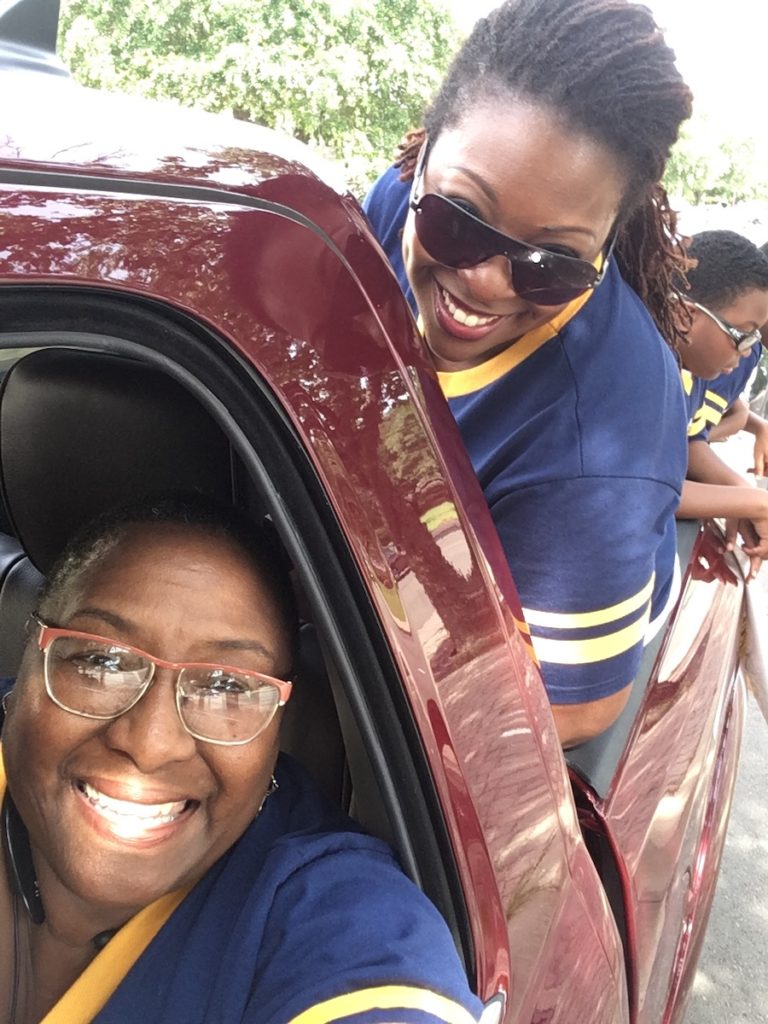
From my earliest days, I remember my family celebrating Juneteenth with a huge family celebration. The birthdays of a great aunt and great uncle sandwiched the holiday falling on June 18 and 20. For years, I thought it was so great that the whole county celebrated Aunt Lila’s and Uncle Monroe’s birthdays.
My extended family on my mama’s side would head out to the country home of Aunt Lila and Uncle Monroe on Juneteenth. Kinfolk from the big cities of Dallas, Fort Worth, and Houston drove in. Grownup cousins who had moved away from Palestine came back to show off their sophistication.
The men would stay up all night barbecuing briskets, ribs, links, and chicken. The women would bring homemade pound cakes, teacakes, sweet potato pies, and peach cobblers along with fried chicken, turnip and collard greens, potato salad, pinto beans, homemade biscuits, and cornbread. Red cream soda and whatever it was that the menfolk had in those brown paper bags out by the pit were the drinks of choice.
The children would go out into the watermelon patch using the “thump” technique to select the ripest and sweetest melons possible. And of course, there was a chocolate birthday cake to mark the birthdays of Aunt Lila and Uncle Monroe. There was always a prayer — over the food, over the family, over the children.
The family spent the day visiting and catching up on everyone’s lives. The great-great aunts, great-aunts, and regular aunts made the kids’ lives a misery with sloppy, loving kisses and mushy bosom hugs that we endured, because they were followed by nickels and dimes pulled from the knotted corners of handkerchiefs.
Kids roamed the still working farm riding the old horse who pulled my uncle’s plow, bothering the chickens in the coup looking for eggs to collect, hiking into the nearby woods, playing baseball with rocks for bases, and grabbing a chicken leg here or a slice of melon there. My big mama and her sister, the birthday girl, circled up under a shade tree (there was no air-conditioning on the farm) with their daughters my mama, her sisters, and first and second cousins, and they traded family gossip (warning us kids away from listening to “grown folk” talk with looks that could freeze Kool-Aid.)
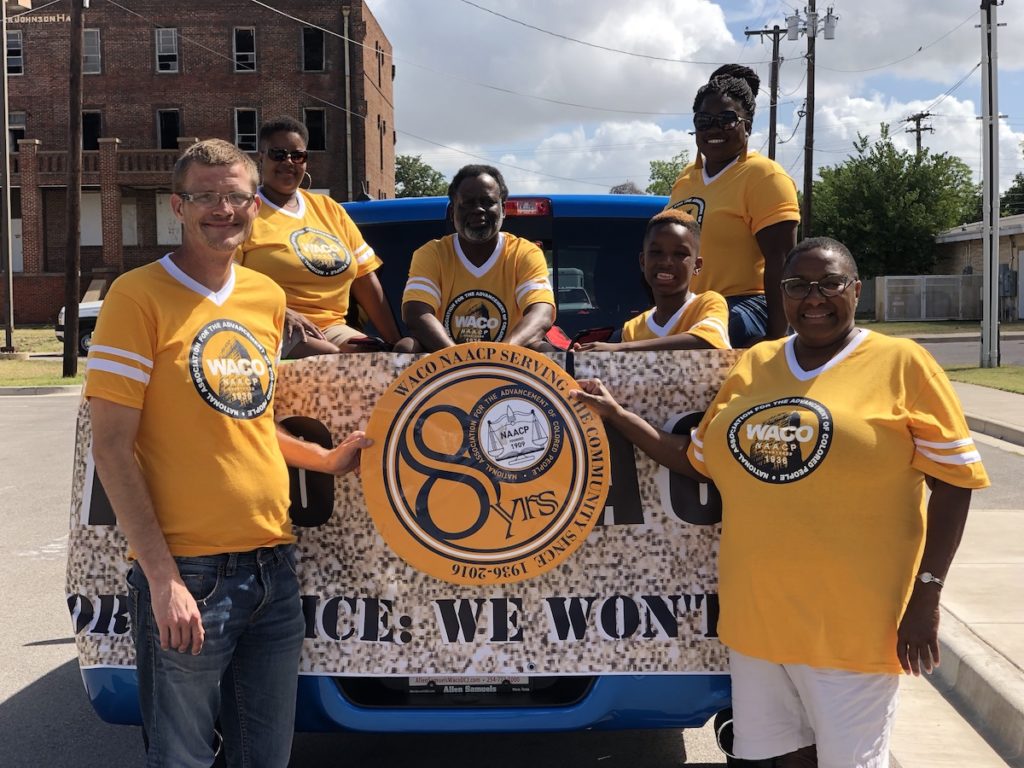
The men gathered under a different shade tree to play dominoes — loud, table hitting, trash-talking dominoes. I thrilled to witness these matches and was delighted when I was given the job of keeping score. I sat between my two favorite uncles (who I learned as an adult were not uncles but second cousins) and kept score like I was scorekeeper for the World Series.
At the end of the day, parents gathered up tired children, wiped as much dirt and food off them as possible, kissed everyone goodbye, and promised to see everyone next Juneteenth (“if the Lord say the same”). On the 20-minute trip back to town (after all, Palestine was the county seat), we three kids would fall asleep to my parents re-hashing all the family gossip my mama had collected. Year after year, I grew up to the predictable rhythms of these Juneteenth celebrations.
Imagine my surprise when I arrived at the University of Texas at Austin to discover that my mostly white classmates had no idea what Juneteenth was or what it celebrated and commemorated. I considered their ignorance their loss and returned to Palestine throughout my undergrad years to celebrate Juneteenth at Aunt Lila’s and Uncle Monroe’s farm.
I was more forgiving of my grad school classmates. Afterall, they were northerners and not expected to understand Texas culture. I patiently explained Juneteenth to them and invited them to celebrate with me in Central Park.
Somewhere along the way, Juneteenth became a national holiday with African Americans around the country celebrating the day possibly as a result of transplanted Texans marking it. Even communities whose celebrations have diminished over the decades have been revived.
The holiday is now marked with picnics, parades, service projects, and Ms./Mr. Juneteenth pageants. In 2020, Juneteenth was observed with protests for social justice. Wacoans have been celebrating Juneteenth for decades and have revived the holiday in recent years with participation in events steadily increasing.
A measure of the holiday’s new status is evident in a feature story on Juneteenth pageants in the The New York Times. The 2020 film, “Miss Juneteenth,” directed by Channing Godfrey Peoples, is being re-released in theaters this week. And wonder of wonders, both the United States Senate and the House of Representatives passed legislation making Juneteenth a national holiday; the bill heads to President Biden’s desk to be signed into law in time for Juneteenth on Saturday.
At the local level, City Councilwoman Andrea Barefield is working on making Juneteenth a legal city holiday.
Juneteenth gives us a moment to reflect on our ability as a country to course correct as we move toward the promise enshrined in the document of our other Freedom Day that all people “are created equal, that they are endowed by their Creator with certain unalienable Rights, that among these are Life, Liberty and the pursuit of Happiness.”
Let us celebrate!
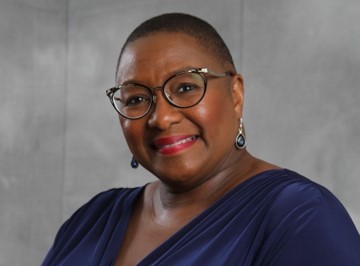
Peaches Henry is president of the Waco NAACP and an English professor at McLennan Community College. She is the proud mother of Corey Henry, who is practicing law in New York. She is currently training her two-year old Juneteenth-born Black lab Samson.
The Act Locally Waco blog publishes posts with a connection to these aspirations for Waco. If you are interested in writing for the Act Locally Waco Blog, please email Ferrell Foster at [email protected].
By Tiffany Gallegos Whitley
June has been a busy month recruiting for UpSkill Waco summer training. I’m excited to have Heaven Lee, our new UpSkill Waco coordinator, onboard the team to help with training coordination and recruitment.

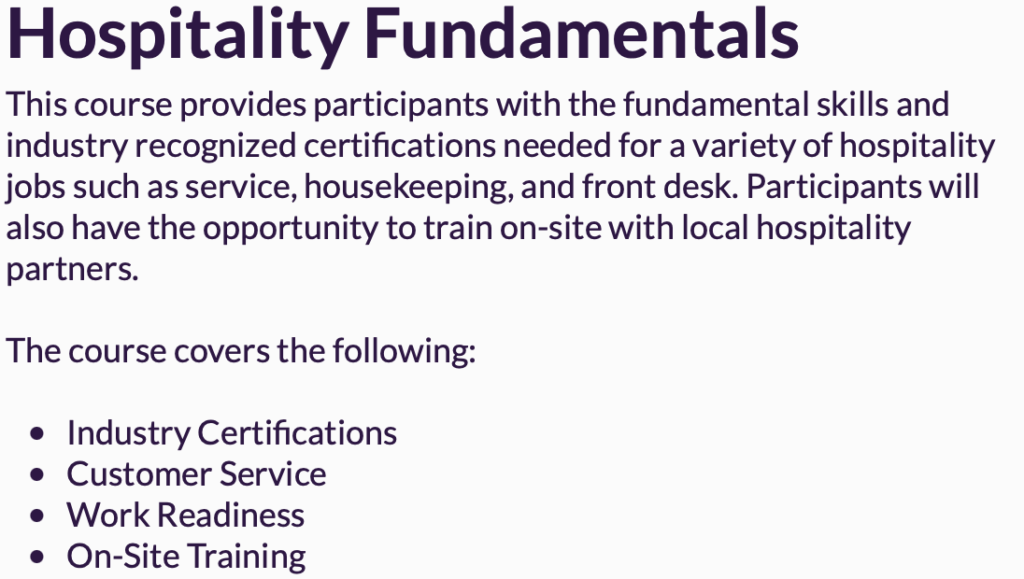
We are actively seeking participants for the next “Construction Core” training with Texas State Technical College July 12 and a new “Hospitality Fundamentals” course with McLennan Community College July 19. In addition to these courses, a healthcare training course is in the works for early August.
The summer classes will be during the day, with evening courses planned for late summer/early fall.
We are working to build a variety of scheduling options and rotating training locations around neighborhood locations to ensure we are fulfilling UpSkill Waco’s purpose of providing flexible and accessible workforce training around the county.
Scholarships are still available for individuals who cannot afford training costs. The applications for training and scholarships can be found on UpSkill Waco’s website at upskill-waco.org. We are looking for 12 students for Construction Core and 16 for Hospitality Fundamentals, so please help us get the word out! Please reach out to [email protected] with any questions.
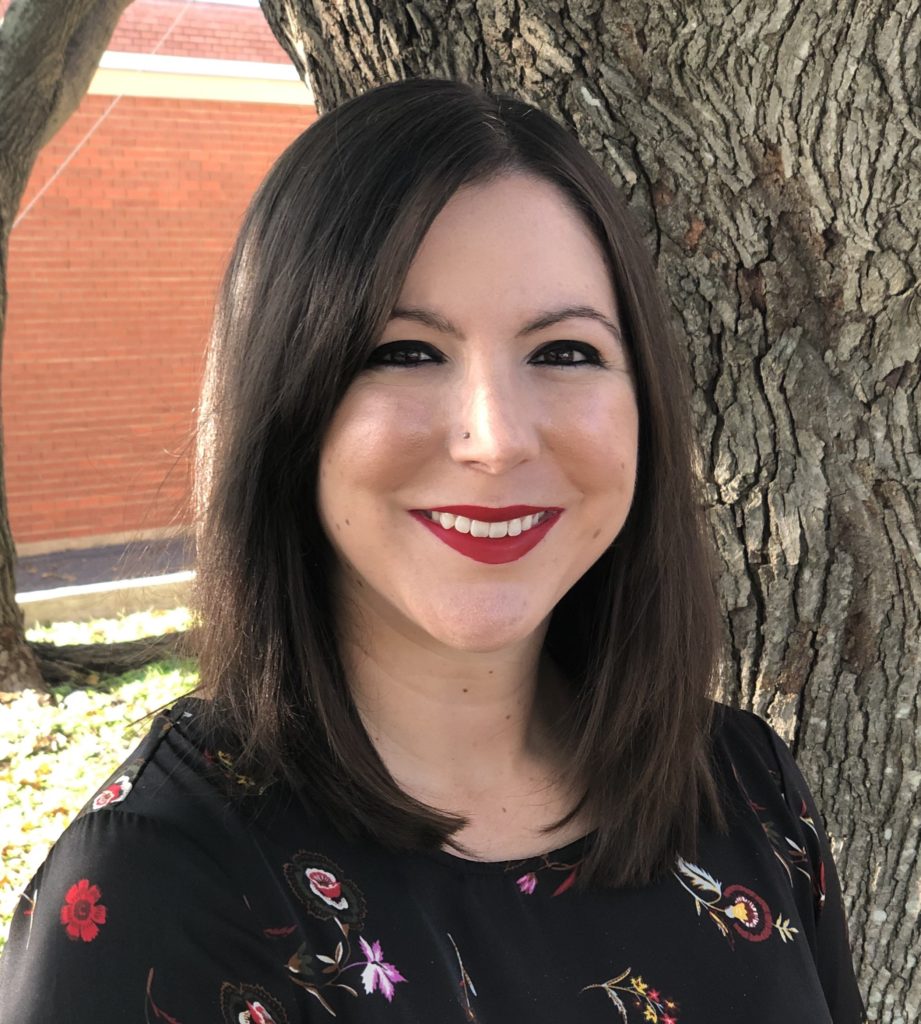
Tiffany Gallegos Whitley is director of workforce initiatives for Prosper Waco.
The Act Locally Waco blog publishes posts with a connection to these aspirations for Waco. If you are interested in writing for the Act Locally Waco Blog, please email Ferrell Foster at [email protected].
By Josh Wucher
More than 750 Waco ISD seniors from Waco, University, and Brazos high schools crossed the stage during graduation ceremonies this weekend at the district’s athletic complex.
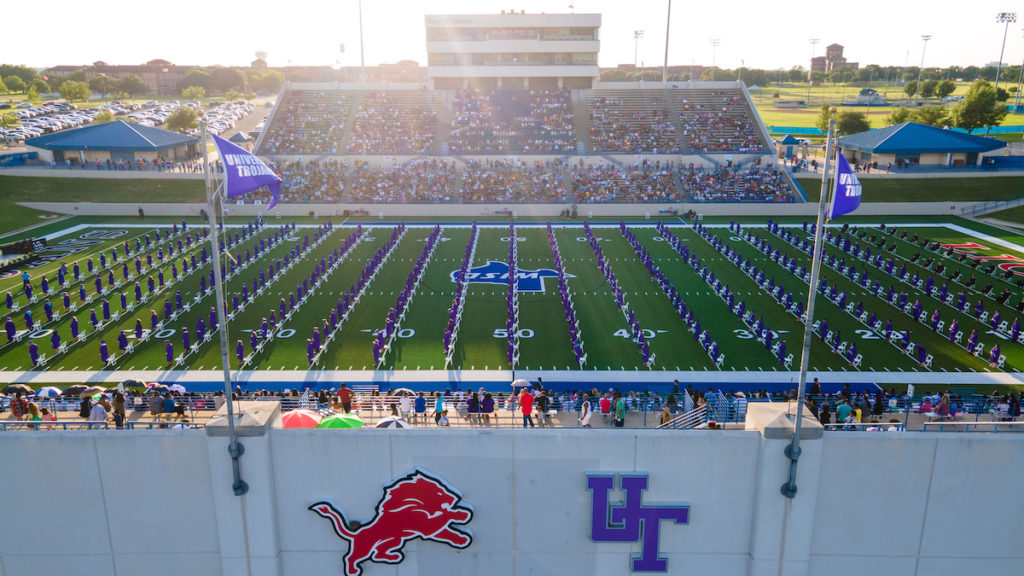
Waco ISD joined parents, family, and friends in recognizing graduates as they capped off their high school experience as the Class of 2021. It was a special celebration of all that the students had accomplished.
“My heart is filled with pride,” Dr. Susan Kincannon, Waco ISD superintendent, expressed to seniors. “How this class, the Class of 2021, has met this moment is inspiring. You have reinvented traditions like prom, embraced new ways of learning, overcome quarantines, and excelled.”
The Class of 2021’s resilience throughout the pandemic was a topic of many graduation speeches.
“We thrived because we did not give up despite all the obstacles we had to overcome,” Emily Alvarado, University High School salutatorian said. “We all went through experiences that changed us, but helped shape us to who we are today.”
Waco High School Salutatorian Bonnie Gibson echoed that sentiment.

“Saying that this year has been unusual would be quite the understatement,” she said. “Yet in spite of it all, we have made it to this day. … As you enter into a new chapter of life, face whatever challenges that may come with determination and perseverance.”
Karin Rodriguez and Evelyn Guevara, University and Waco high school valedictorians respectively, acknowledged how much their families helped guide them on their 13-year educational journey, as well as honored their Hispanic heritage.
“I personally am proud of my Hispanic origin and proud to be a son of Mexican immigrants, who traveled here to make a better life for me and my brothers,” Rodriguez said. “Even though they had their own hardships and came home from work tired and drained, they constantly pushed me to do my best. … Because of their constant support, I am forever grateful.”
Guevara, Waco High’s first Hispanic female valedictorian, similarly shared a pride in being a first-generation student.
“Thank you to my parents, who immigrated to the United States with nothing, to give me everything. This is for you and by you,” she said. “As much as we have grown and matured over the years, Waco ISD has grown alongside us. They have given us the opportunities and the platform to become the best version of ourselves … I am very proud to say that I am a product of Waco ISD for this reason.”
Speaking to that foundational vision of supporting students, School Board Vice President Stephanie Korteweg said Waco High’s Class of 2021 represents the latest chapter in the school’s history, which dates back more than a century to a building on Columbus Avenue.
“While the location has changed over the years and new buildings have replaced old, the school’s legacy of preparing students to succeed beyond its walls remains constant,” she said.
Korteweg also emphasized the united team of University staff and administrators, along with friends and families, who have encouraged and guided students throughout their time in Waco ISD.
“This community won’t come to an end when you walk across this stage,” she said. “You will share these moments with your fellow graduates for the rest of your life, and no matter where that life takes you, we will be cheering you on.”
Principals concluded each ceremony with words of wisdom they typically share during morning announcements.
“We encourage you to remember two things: [Our Goal] Love, Serve, and Care; and Once a Trojan, Always a Trojan,” Ricky Edison, principal of University High, said.
“Graduates, know your worth; know the greatness that you possess. You are here to win; you are born to win,” James Stewart, principal of Waco High, said.
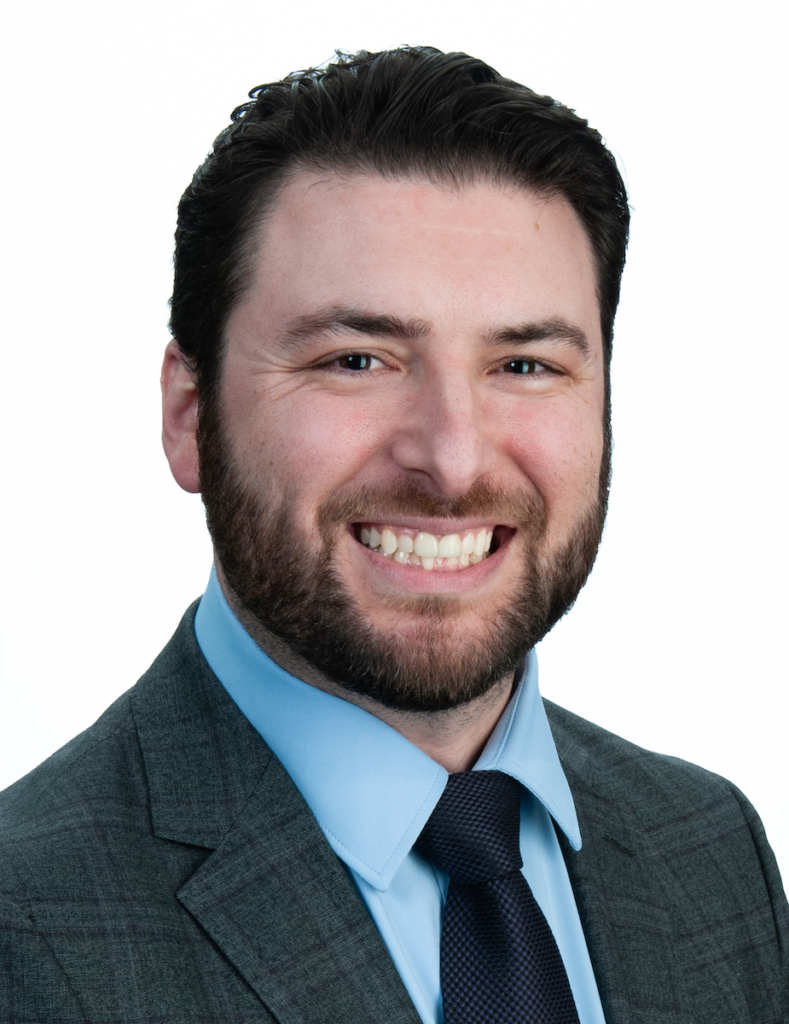
Joshua Wucher is Waco ISD’s executive director for communications.
The Act Locally Waco blog publishes posts with a connection to these aspirations for Waco. If you are interested in writing for the Act Locally Waco Blog, please email Ferrell Foster at [email protected].
By Serena M. Stevenson
Waco Transit System (WTS) is set to complete the preliminary engineering and environmental review process for the proposed 13-mile Bus Rapid Transit (BRT) project. Completing this process advances the development of Waco’s first BRT project to provide safe, reliable, and efficient transit service.
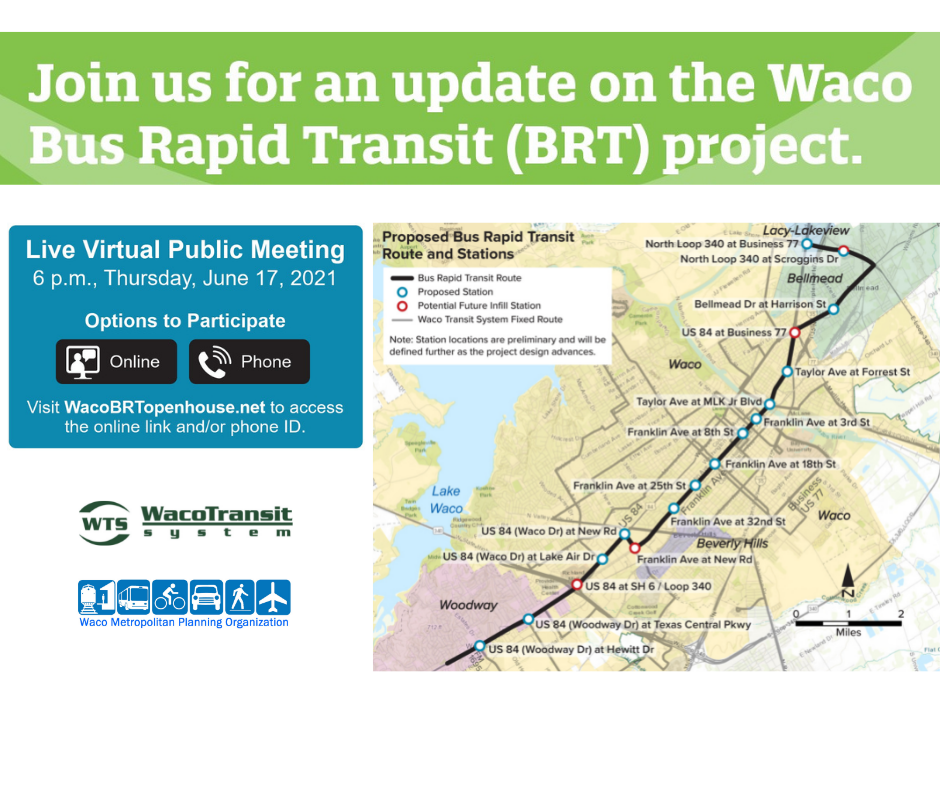
Over the last 10 months, WTS and its consultant have been refining the BRT station design and conducting evaluations to confirm the location for 14 proposed BRT stations. As part of this process, WTS continues to seek public input to help inform the project.
Community members are invited to participate in a live virtual public meeting that will be held at 6 p.m. Thursday, June 17, to learn about the BRT project and share feedback. During this meeting the project team will present the final recommendations for the station locations, provide an update on the station design, and share details about next steps.
In light of restrictions on public gatherings, this public meeting is being offered online and via phone, rather than in-person. Visit WacoBRTopenhouse.net to access the online link and/or phone ID.
The information that will be presented during this live virtual meeting and a recording of the meeting will be made available online at WacoBRTopenhouse.net.
Community members interested in providing feedback to help inform the BRT project are encouraged to call the project comment line at 844-922-6278; email the project at [email protected]; and/or complete the online feedback form available at wacobrtopenhouse.net/feedback. The public comment period for this phase of this project will close Friday, July 2.
About the Waco BRT Project: The proposed 13-mile BRT project that is in development would provide buses every 15-minutes during peak service hours, including extended service hours to 10 p.m. and service on Sundays to offer safe, reliable, and efficient transit service. The purpose for implementing BRT service in Waco is to offer residents enhanced mobility and to provide improved access to jobs, medical and social services, and educational facilities. The proposed BRT route would also provide better and more efficient transfers to other routes operated by Waco Transit System. The BRT project is now at the next phase in the development process which involves preliminary engineering and an environmental review pursuant to the National Environmental Policy Act. For more information about the Waco BRT project, visit the project webpage at waco-texas.com/transit/BRT.
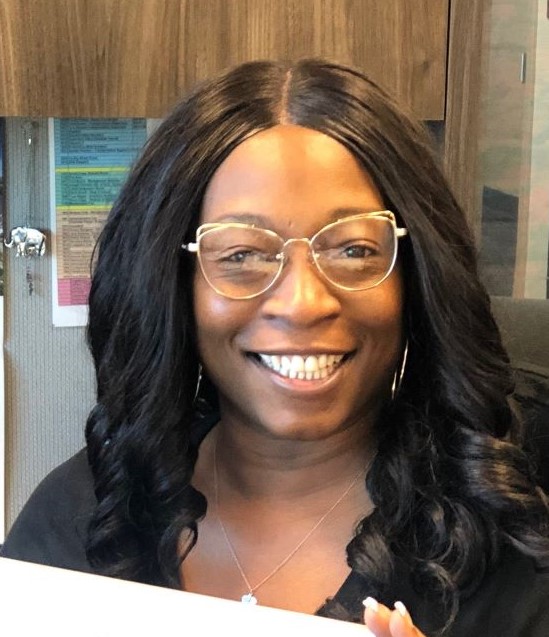
Serena M. Stevenson is general manager of Waco Transit System.
The Act Locally Waco blog publishes posts with a connection to these aspirations for Waco. If you are interested in writing for the Act Locally Waco Blog, please email Ferrell Foster at [email protected].
By Jimmy Dorrell
With the previously rumored and publicly unannounced closing of the Oak Lodge Motel, based on a desire “to make our city better,” those who live on the edges are about to lose even more access to affordable housing and will likely move into worse conditions. While I realize it is hard to defend this old, challenging motel complex (and other substandard hotels) due to its history, petty drugs, and crime, at this time in Waco there are almost no other choices for housing for hundreds of these “invisible homeless,” including some families with children. Some of those tenants are members of Church Under the Bridge, who attend weekly.
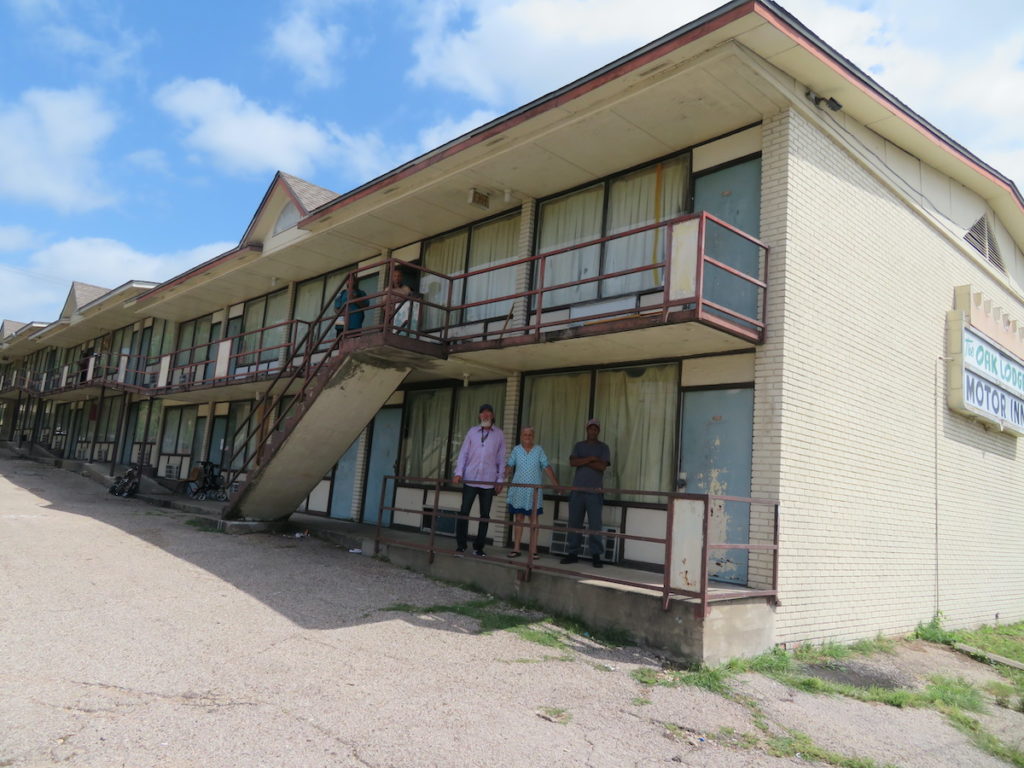
I know our city leaders and some community members care about the poor and may even acknowledge the growing lack of affordable housing in Waco for them. The lack of living wages at work in Waco contributes to their inability to rent housing. Most likely these discussions will not produce any viable answers for years that address the current and growing glut of options for Waco’s most vulnerable.
It is a crisis, not just a problem. It will only get worse for them in the months ahead.
While Church Under the Bridge has recently initiated a new ministry to focus more on that very population, we also have few housing resources to help. Our first ministry goal is to build deeper relationships with the families and individuals and walk with them through their current plight, yet we are realistic to know there are fewer resources that really address the bigger issues of housing them in Waco. It is a community problem that demands increased attention and even interim answers.
I challenge the churches and caring community to make every effort at your disposal to save these and create new housing options before they are evicted onto our streets. I also encourage you to discourage the removal of these who will be displaced until each of them has adequate housing.
Mohandas Gandhi said, “The greatness of a nation can be judged by how it treats its weakest members.” That goes for cities, as well.
We commit to pray for our leaders and local churches as you struggle with these challenging issues and for the poor!
Here are some articles that may help highlight the challenge in our community:
“The People Staying and Living In America’s Hotels” https://www.newyorker.com/culture/photo-booth/the-people-staying-and-living-in-americas-motels
“America’s Hidden Homeless”: https://www.aljazeera.com/features/2016/7/30/americas-hidden-homeless-life-in-the-starlight-motel
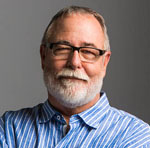
Jimmy Dorrell is pastor of Church Under the Bridge in Waco and founder of Mission Waco.
The Act Locally Waco blog publishes posts with a connection to these aspirations for Waco. If you are interested in writing for the Act Locally Waco Blog, please email Ferrell Foster at [email protected].
By Gary Lee Webb
I have been in Waco 21 years. Before that, I had never heard about Toastmasters International; although, I did participate in some speaking organizations back in high school (Model UN while in California and the Arizona Model Legislature) and thought I was a great speaker.
It was not until a demonstration of Toastmasters at my work in 2007 that I learned about the organization. It reminded me of the fun I had in high school, and one can always improve their communication skills, so I joined.

I quickly learned that I was only good, not great. I had a long way to go. But Toastmasters has taken me from being a good speaker to extremely good, top decile in the world. I learned to use my voice to its full capacity — pitch and intonation, speed and cadence, how to moderate to best effect, when to stage whisper across a room. I improved my use of gestures and movement across the speaking area. I learned rhetorical devices, assonance and alliteration, and even the use of unusual techniques such as the paraprosdokian twist. After all, the voice is the sharpest scalpel within the surgeon’s kit of speaking. If you use it well, people will be intrigued and you can paint pictures.
I also went from being a horrible humorist to someone who can occasionally win a humor contest. That is something I must still improve, but at least people do not stampede the door, exiting when I tell a joke.
I learned to think quickly on my feet, replying in one to two minutes to off-the-wall questions. In Toastmasters, we not only practice prepared speaking but also impromptu speaking at every meeting. We call it “Table Topics.” A predesignated Table Topics Master queries random people with questions he prepared earlier. Getting good at answering is a very useful skill for job interviews or a quick proposal to one’s boss.
Something else we practice at meetings is the art of constructive criticism: nicely telling a speaker where they can improve and how to do so, in a way that encourages him to take your advice. After all, our goal is to help every speaker to become better. Leaders should know how to evaluate others, whether they supervise paid employees or a group of volunteers.
We also teach leadership skills, much to my personal benefit. When I joined Toastmasters, I was happy to take a supportive role, assisting the leadership team, but never the lead role. Now I have learned to take the reins, if necessary. Thrice within the last 12 years, I have taken on one-year terms as Area or Division Governor or Director (titles have changed).
Finally, we learn to guide, teach, and train. Every new member gets a mentor to guide them, and when they have become experienced we hope they will do the same. I have mentored three-dozen new members, assisting them to become better speakers and leaders. Some of them have hit heights I have never reached – what better result can any teacher expect? I have also taught the speechcraft seminar sixteen times: eleven weeks on speaking basics. More advanced skills as well. And I have led officer training for multiple leaders and even organized the event held at Baylor University, August 2014: ten trainers, twelve classes, training sixty chapter officers.
In short, Toastmasters International has enriched my life and improved my skills. What can it do for you?
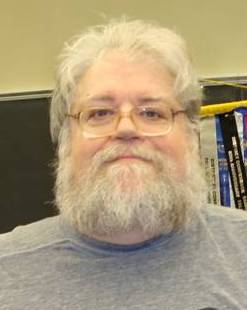
Gary Lee Webb is the grandfather of two (age 9 and 7), a long-time member of Toastmasters International and the National Storytelling Network, and the author of 17 published short stories. He is also a world traveler (having lived on three continents), an astronomer, and a software engineer. Currently, he is vice president of education for three Waco public Toastmaster chapters and can be reached at [email protected].
The Act Locally Waco blog publishes posts with a connection to these aspirations for Waco. If you are interested in writing for the Act Locally Waco Blog, please email Ferrell Foster at [email protected].
By Ferrell Foster
First, I should confess that I have a problem. I tend to get a bit aggressive when driving, especially regarding people who speed up to get ahead and pull in front of me and then break because they were going too fast. It’s especially irritating when there is plenty of space behind me.
I don’t mean to get aggressive, but I do. I think it’s part of getting older. I can no longer take out my competitiveness on a sporting field. My two human wheels no longer work so well, so I need to give my four automotive wheels a workout.

You’re probably wondering if I have an aggression problem in general. No. It’s really odd that the only time I really get wound up is when I drive around stupid people. And then I get stupid right along with them. (Forgive me, Mom; I know I’m not supposed to call anyone stupid, including myself. Moms haunt us even when we are 65.)
Now, for a public safety warning. It’s not a warning about me. I’ve only had one wreck in my 50 years of driving. Even when dealing with road rage, I tend to obey the laws.
Many of you know that I only moved to Waco last year and didn’t drive much in the early months because of the need to hide from other people due to COIVD. As things have gotten closer to normal, one thing has stood out vividly.
People in Waco like to run red lights. I don’t know if the yellow lights are shorter than in most places or if Wacoans are more impatient or more distracted by their phones. Maybe it’s just peer pressure; when everyone seems to be running red lights you feel a certain cultural pressure to conform and speed up on red. Check your rearview mirror if you are stopping under a yellow light; you may have to let off your brake.
Is this my imagination? Or is it just the traffic corridor that connects my office with my house — roughly the Extraco Events Center to near Hewitt?
Last year I wrote several pieces under the heading of being “New to Waco,” at the request of Ashley Thornton. I still feel new in some ways and thought I should warn those who are newer than me.
Of course, every town has its red-light runners, but they seem to have multiplied here. It seems with each light change it is more likely that someone will run a red light than that no one will. And I’m not talking about the light turning red while the car is already in the box; I’m talking about blatant red running.
So, for all of my love for this community, this is one thing that’s a little scary. When entering an intersection, be sure to look both left and right. There are people out there who are either color blind or cavalier about the meaning of a bright red light hanging from a pole in the middle of the street.
Let’s be careful out there so we can enjoy one another. And I promise I’m working on my driving. I’m seeking to make driving a moment of Zen so I can pretend the goings on around me are peripheral to reality. Of course, the truth is that Zen or no Zen, we can kill each other out there in a blink of the eye or a glance at a phone.
I’m loving Waco, even on the road.
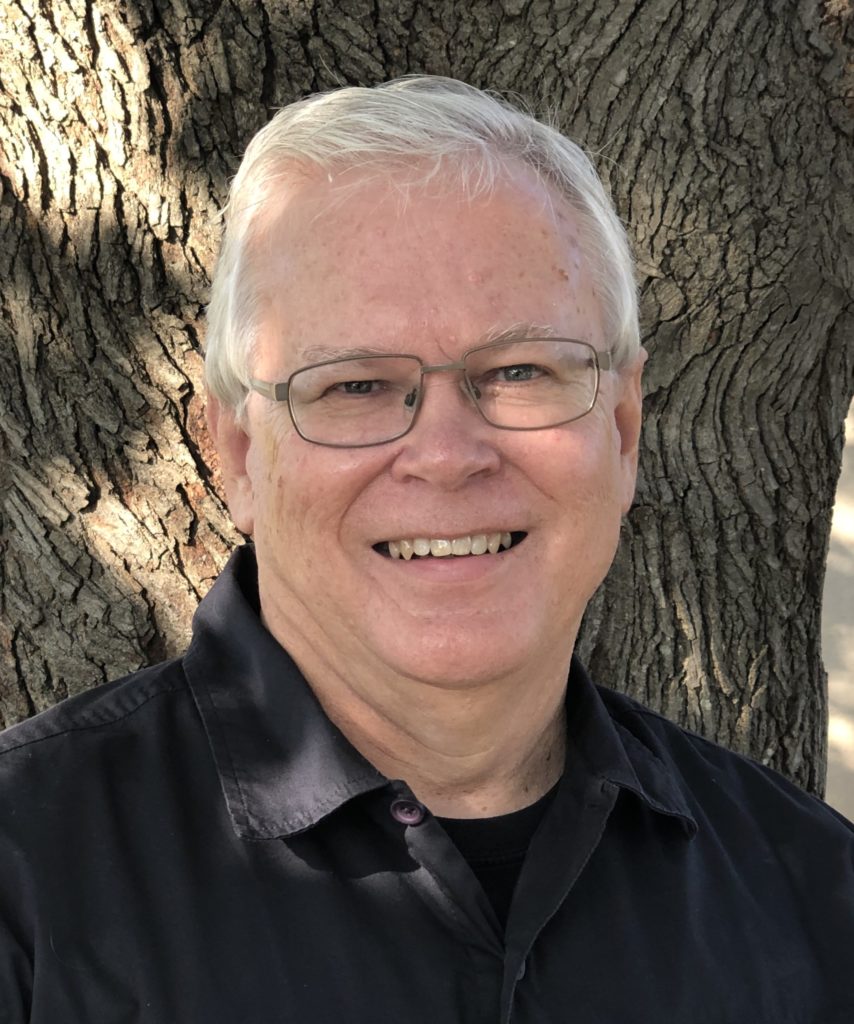
Ferrell Foster is acting executive director of Act Locally Waco and senior content specialist for care and communication with Prosper Waco.
The Act Locally Waco blog publishes posts with a connection to these aspirations for Waco. If you are interested in writing for the Act Locally Waco Blog, please email Ferrell Foster at [email protected].

